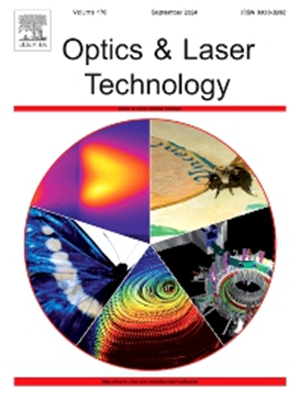Thermal effect suppression of end-pumped rod-like Nd:YAG laser crystal utilizing the diamond cap strategy
IF 4.6
2区 物理与天体物理
Q1 OPTICS
引用次数: 0
Abstract
In high-power laser systems, thermal lensing effects and thermal birefringence in laser gain media significantly impact beam quality and stability. This study simulates different end-capped structures of Nd:YAG gain media to assess their effect on thermal characteristics. Thermal lensing effects were evaluated through optical path differences and thermal focal lengths, while thermal birefringence effects were assessed using depolarization losses. Results show that diamond cap can reduce the peak temperature of the gain medium by 30.0 K. Optical path difference and thermal focal length changes confirm that diamond caps can minimize the thermal lensing effect. Moreover, the reduction of the depolarization loss suggests a reduction in the polarization state. Futhermore, this paper explores the optimization of diamond geometry to enhance laser system stability. Larger diamond radii and thicknesses prove more effective in diminishing optical path differences and depolarization loss, with changes in radius showing a significant impact on thermal performance. This research enhances laser stability and performance and lays a theoretical foundation for future laser thermal management strategies.
利用钻石帽策略抑制末端泵浦棒状 Nd:YAG 激光晶体的热效应
在高功率激光系统中,激光增益介质中的热透镜效应和热双折射会严重影响光束质量和稳定性。本研究模拟了 Nd:YAG 增益介质的不同端盖结构,以评估它们对热特性的影响。热透镜效应通过光路差和热焦距进行评估,而热双折射效应则通过去极化损耗进行评估。结果表明,金刚石帽能将增益介质的峰值温度降低 30.0 K。光路差和热焦距的变化证实,金刚石帽能将热透镜效应降至最低。此外,去极化损耗的减少表明极化状态有所降低。此外,本文还探讨了如何优化金刚石的几何形状,以增强激光系统的稳定性。事实证明,较大的金刚石半径和厚度能更有效地减少光路差异和去极化损耗,而半径的变化对热性能也有显著影响。这项研究提高了激光的稳定性和性能,为未来的激光热管理策略奠定了理论基础。
本文章由计算机程序翻译,如有差异,请以英文原文为准。
求助全文
约1分钟内获得全文
求助全文
来源期刊
CiteScore
8.50
自引率
10.00%
发文量
1060
审稿时长
3.4 months
期刊介绍:
Optics & Laser Technology aims to provide a vehicle for the publication of a broad range of high quality research and review papers in those fields of scientific and engineering research appertaining to the development and application of the technology of optics and lasers. Papers describing original work in these areas are submitted to rigorous refereeing prior to acceptance for publication.
The scope of Optics & Laser Technology encompasses, but is not restricted to, the following areas:
•development in all types of lasers
•developments in optoelectronic devices and photonics
•developments in new photonics and optical concepts
•developments in conventional optics, optical instruments and components
•techniques of optical metrology, including interferometry and optical fibre sensors
•LIDAR and other non-contact optical measurement techniques, including optical methods in heat and fluid flow
•applications of lasers to materials processing, optical NDT display (including holography) and optical communication
•research and development in the field of laser safety including studies of hazards resulting from the applications of lasers (laser safety, hazards of laser fume)
•developments in optical computing and optical information processing
•developments in new optical materials
•developments in new optical characterization methods and techniques
•developments in quantum optics
•developments in light assisted micro and nanofabrication methods and techniques
•developments in nanophotonics and biophotonics
•developments in imaging processing and systems

 求助内容:
求助内容: 应助结果提醒方式:
应助结果提醒方式:


